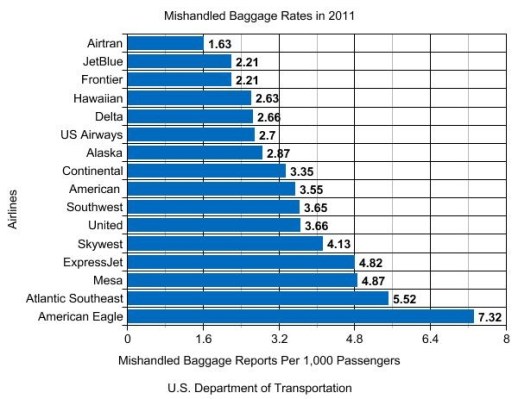[Article amended 6/20/12]
After a long flight, there’s nothing worse than waiting at the baggage claim carousel for 15 minutes only to discover that your luggage hasn’t made the trip with you. Almost every traveler has been in baggage-claim hell, dealing with lost or delayed baggage. Now a new Congressional report puts forward the idea that travelers could be reimbursed for their misery — whether or not the airline locates your bag.
The report, issued June 14 by the Government Accountability Office, listed possible changes to the current baggage system that might turn the tide back in the favor of the consumer after years of rising airline fees. Currently, airlines are required by the Department of Transportation to make “every reasonable effort” to return delayed luggage to its owner within 24 hours. They also owe you up to $3,300 if they lose your luggage permanently. However, airlines have always had complete discretion in deciding how to handle situations where bags are lost for multiple days.
In 2011, more than 1.9 million bags were “mishandled” — meaning delayed, lost, damaged or stolen — during domestic flights, according to the Department of Transportation. While the number seems large, it’s actually been decreasing each year thanks to improved tracking technology and fewer checked bags in general.
Here’s a breakdown on how the 15 largest airlines in the U.S. fared (keep in mind that the Department of Transportation doesn’t track total checked bags, only total passengers, so these numbers are only an approximation of airline performance):
(MORE: Flying Overseas? Your Suitcase May Need Its Own $100 Ticket)
The Accountability Office’s report suggests as a possible response to this problem a metered system for paying customers based on how long their baggage is caught in limbo. Right now travelers can file for compensation from their airline if the delay is so excessive that it forces the customer to spend money out of pocket for things like toiletries. But the DOT only mandates that airlines pay for “reasonable” expenses, so there’s no telling what a specific carrier might offer you.
Until a more specific mandate is on the books, how likely are airlines to cough up reimbursements? Currently, Delta Airlines offers a rebate of $25 to $50 if your bag is delayed more than 12 hours. But most other airlines are vague about what happens when your bag doesn’t make your flight. A more direct nudge from the federal government might help. In 2011 the Department of Transportation introduced new consumer protections that require airlines to refund fees for lost bags and include all taxes and fees in advertised fares.
A uniform metered system would please customers, but it would likely come at an expense. Tracking delays and developing a payout system based on those statistics would require new administrative structures. And those costs would likely get baked into all of our ticket prices. “You don’t want to create a huge bureaucracy if you don’t really have a problem that deserves a huge bureaucracy,” said Gerald Dillingham, a Government Accountability Office director who authored the report. “Those costs that require new systems will eventually percolate down to the customer in the form of additional costs.”
(MORE: Syria – A War on Two Fronts)
There are some precautions travelers can take to minimize these issues. When possible, Dillingham suggests, avoid connecting flights and especially connecting flights on different carriers. Arriving to the airport late with bags to check also increases the chance of your luggage being dumped on the next flight, and sometimes even waives the airline’s responsibility to recover your baggage quickly.
“It’s not always the airline that’s involved in this,” Dillingham said. “We as customers need to think about these things in how we book our flights.”
A previous version of this article mistakenly stated that the GAO was “advocating” or “proposing” a metered system of compensation for missing luggage, when in fact the office — a non-partisan, investigative agency that does performance and financial audits for Congress — doesn’t make formal proposals or advocate for them, but merely lists possible options.


